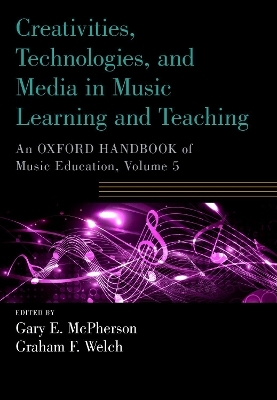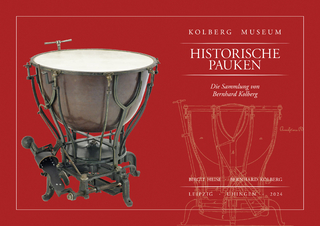
Creativities, Technologies, and Media in Music Learning and Teaching
Oxford University Press Inc (Verlag)
978-0-19-067456-4 (ISBN)
Creativities, Media, and Technology in Music Learning and Teaching is one of five paperback books derived from the foundational two-volume Oxford Handbook of Music Education. Designed for music teachers, students, and scholars of music education, as well as educational administrators and policy makers, this fifth book in the set comprises three complementary sections: musical creativity as practice; music teaching and learning through technology; and the interplay of media, music, and education. The first section reviews notions of musical creativity, examining practice-based perspectives to support and develop understanding of the diverse types of creativity found within music education practice across the globe. In the second section, authors explore the essential role of technology in musical discourse and in various forms of musical learning, even as technology continually evolves and the needs and possibilities continue to rapidly change. The third section provokes readers to assess their own thinking about the transformative changes occurring within the discipline as a result of advances in media, and the increasing infiltration of media into all aspects of life, the classroom, and music making.
Contributors
Andrew R. Brown, Pamela Burnard, Bernadette Colley, Ian Cross, Rokus de Groot, Steven C. Dillon, Randi Margrethe Eidsaa, David G. Hebert, Evangelos Himonides, Neryl Jeanneret, Ailbhe Kenny, Andrew King, Eleni Lapidaki, Felicity Laurence, Samuel Leong, Bo Wah Leung, Alagi Mbye, Gary E. McPherson, Ross Purves, Tal-Chen Rabinowitch, S. Alex Ruthmann, Eva Sæther, Jonathan Savage, Reza Shayesteh, Petros Stagkos, Matthew D. Thibeault, Evan S. Tobias, Carole Waugh, Graham F. Welch
Gary E. McPherson studied music education at the Sydney Conservatorium of Music, before completing a master of music education at Indiana University, a doctorate of philosophy at the University of Sydney, and a Licentiate and Fellowship in trumpet performance through Trinity College, London. He is the Ormond Professor and Director of the Melbourne Conservatorium of Music at the University of Melbourne, and has served as National President of the Australian Society for Music Education and President of the International Society for Music Education. His research interests are broad and his approach interdisciplinary. His most important research examines the acquisition and development of musical competence, and motivation to engage and participate in music from novice to expert levels. With a particular interest in the acquisition of visual, aural and creative performance skills he has attempted to understand more precisely how music students become sufficiently motivated and self-regulated. Graham F. Welch holds the University College London (UCL) Institute of Education Established Chair of Music Education. He is elected Chair of the internationally based Society for Education, Music and Psychology Research (SEMPRE), a former President of the International Society for Music Education (ISME), and past co-chair of the Research Commission of ISME. Current Visiting Professorships include the Universities of Queensland (Australia), Guildhall School of Music and Drama, and Liverpool (UK). He is an ex-member of the UK Arts and Humanities Research Council's (AHRC) Review College for music and has been a specialist consultant for Government departments and agencies in the UK, Italy, Sweden, USA, Ukraine, UAE, South Africa and Argentina. Publications number over three hundred and fifty and embrace musical development and music education, teacher education, the psychology of music, singing and voice science, and music in special education and disability.
Part 1
Musical Creativity as Practice
Part Editor: Pamela Burnard
Chapter 1. Commentary: Musical Creativity as Practice
Pamela Burnard
Chapter 2. Empathy and Creativity in Group Musical Practices: Towards a Concept of Empathic Creativity
Ian Cross, Felicity Laurence, and Tal-Chen Rabinowitch
Chapter 3. Intercultural Tensions and Creativity in Music
Eva Saether with Alagi Mbye and Reza Shayesteh
Chapter 4. Communal Creativity as Socio-musical Practice
Eleni Lapidaki, Rokus de Groot, and Petros Stagkos
Chapter 5. Assessing Creativity in Music: International Perspectives and Practices
Samuel Leong, Pamela Burnard, Neryl Jeanneret, Bo Wah Leung, and Carole Waugh
Chapter 6. Creativity in Partnership Practices
Bernadette D. Colley, Randi Margrethe Eidsaa, Ailbhe Kenny, and Bo Wah Leung
Part 2
Music Learning and Teaching through Technology
Part Editor: Evangelos Himonides
Chapter 7. Commentary: Music learning and Teaching through Technology
Evangelos Himonides
Chapter 8. The Misunderstanding of Music-Technology-Education: A Meta Perspective
Evangelos Himonides
Chapter 9. Technology and the Educator
Ross Purves
Chapter 10. The Student Prince: Music-Making with Technology
Andrew King
Chapter 11. Driving forward Technology's Imprint on Music Education
Jonathan Savage
Part 3
Media, Music, and Education
Part Editor: Matthew D. Thibeault
Chapter 12. Commentary: Media, Music, and Education
Matthew D. Thibeault
Chapter 13. Music Education in the Postperformance World
Matthew D. Thibeault
Chapter 14. Let's Play! Learning Music through Video Games and Virtual Worlds
Evan S. Tobias
Chapter 15. Collaborative Digital Media Performance with Generative Music Systems
Andrew R. Brown and Steven C. Dillon
Chapter 16. Music Learning and New Media in Virtual and Online Environments
S. Alex Ruthmann and David G. Hebert
| Erscheinungsdatum | 09.07.2018 |
|---|---|
| Reihe/Serie | Oxford Handbooks |
| Zusatzinfo | 17 line, 3 halftone, 4 combo |
| Verlagsort | New York |
| Sprache | englisch |
| Maße | 244 x 170 mm |
| Gewicht | 499 g |
| Themenwelt | Kunst / Musik / Theater ► Musik ► Instrumentenkunde |
| Kunst / Musik / Theater ► Musik ► Pop / Rock | |
| Schulbuch / Wörterbuch ► Lexikon / Chroniken | |
| Sozialwissenschaften ► Pädagogik ► Schulpädagogik / Grundschule | |
| ISBN-10 | 0-19-067456-3 / 0190674563 |
| ISBN-13 | 978-0-19-067456-4 / 9780190674564 |
| Zustand | Neuware |
| Haben Sie eine Frage zum Produkt? |
aus dem Bereich


